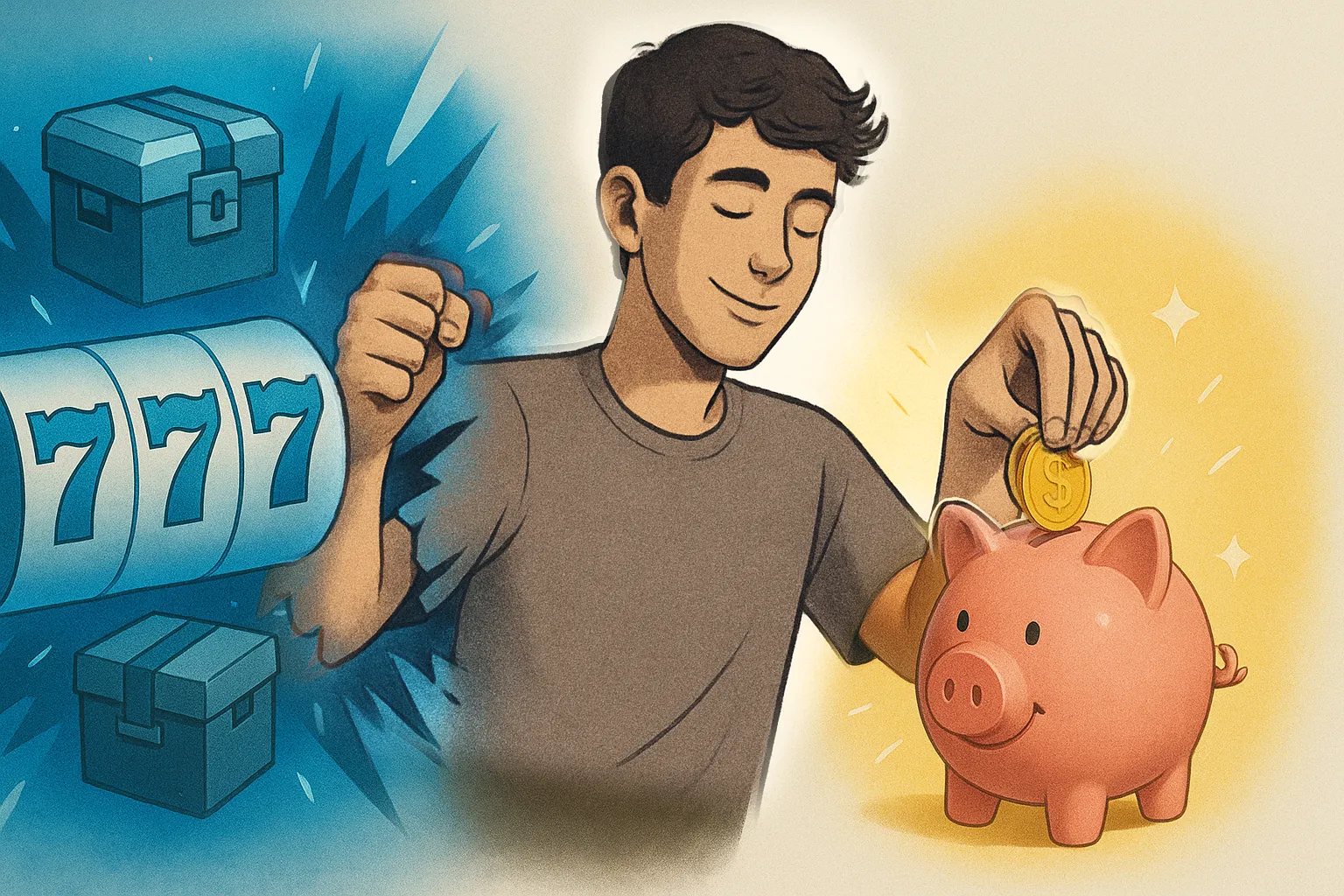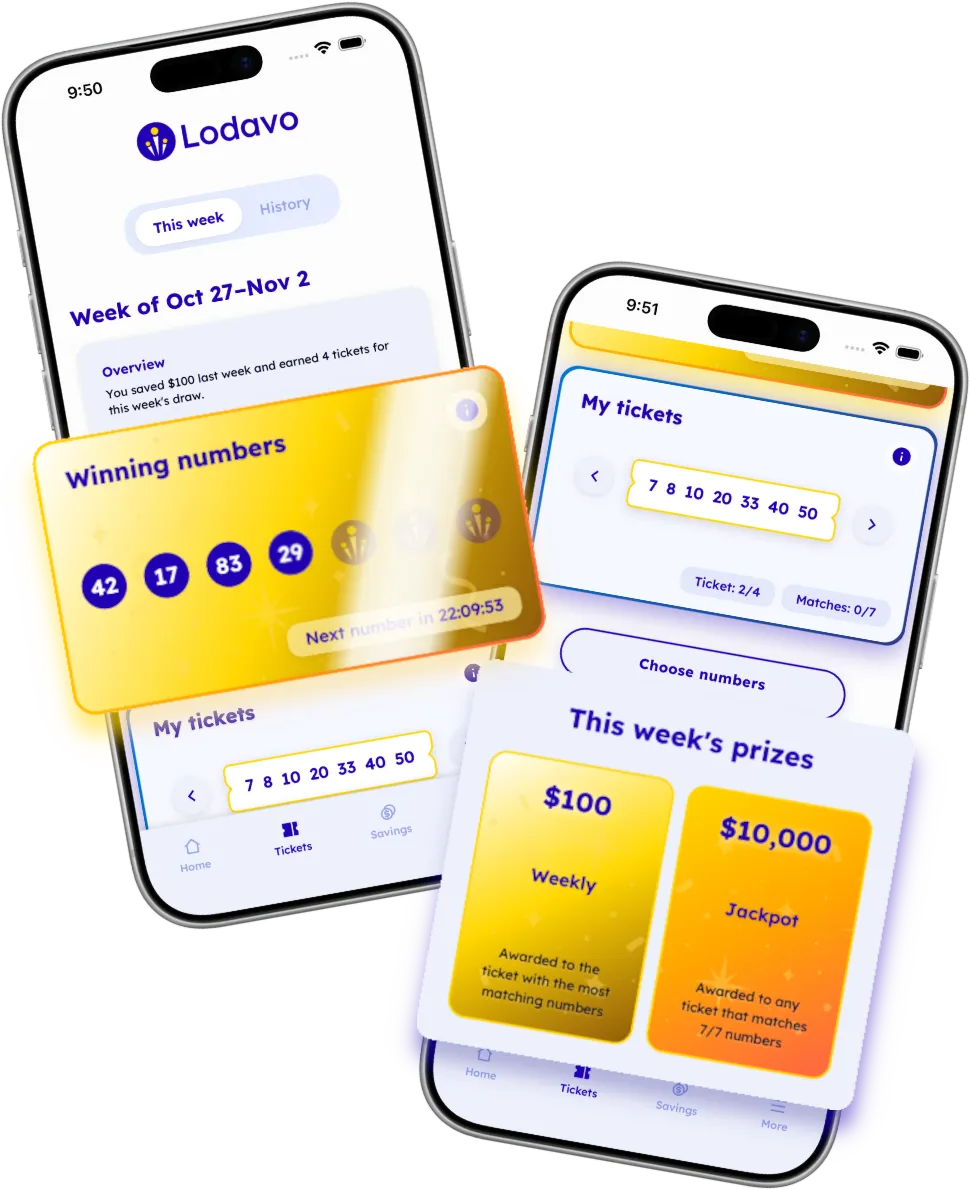Teen Gambling: The Hidden Dangers in Video Games

It often starts with a click: a glowing crate, a “spin,” a promise of something rare. No bouncers, no age check, just a rush of anticipation that feels harmless because it’s “only a game.” But this is how gambling-like behaviour has slipped into everyday play. In Canada, that shift is quietly becoming a public-health problem, with real effects on teens’ money habits, mental health, and long-term decision-making. At Lodavo, we want to help young Canadians recognize these gambling-like mechanics, and with our Canadian prize-linked savings app, build saving habits that beat the house over time.
Origins of Teen Online Gambling: MapleStory’s Gachapon Ticket (2004)
In 2004, the MMORPG MapleStory introduced the Gachapon ticket, a game mechanic where players could spend real or virtual currency to receive a randomized in-game item. This seemingly harmless feature fundamentally changed video game monetization by tapping into the psychological mechanisms that drive gambling.
Players were enticed not by what they received but by what they might receive. The rarest items had extremely low probabilities, incentivizing repeat purchases. This introduced countless teenagers to gambling-like behaviour in an environment with no age checks, no loss limits, and no regulatory oversight. This model paved the way for countless other games and franchises to adopt similar strategies. This mechanic fundamentally changed game monetization by tapping into the same psychological triggers that drive gambling, according to gambling research organizations.
The Psychology Behind Gambling Addiction
Gambling in all forms (including virtual loot boxes) manipulates the brain’s dopamine reward system, which governs motivation and pleasure. Research shows that dopamine doesn’t peak upon receiving the reward, but during the anticipation of the outcome, making randomized systems particularly addictive, as Harvard Medical School research on addiction and the brain’s dopamine reward system explains.
For teenagers, this is even more dangerous. During adolescence, the prefrontal cortex (responsible for impulse control and risk assessment) is still developing, while the limbic system (which seeks pleasure and novelty) is hyperactive — a pattern confirmed by research on adolescent brain development. This biological imbalance makes youth more vulnerable to impulsive decisions and addiction-prone behaviours.
How the Gaming Industry Profits from Teenage Gambling
Following the success of MapleStory, developers quickly adopted loot boxes, skin betting, and gacha mechanics to drive profits. Popular franchises such as FIFA, Overwatch, Team Fortress 2, and Counter-Strike: Global Offensive implemented systems that rewarded players randomly, with rare items often resold on third-party marketplaces for real cash.
EA’s FIFA Ultimate Team has faced international scrutiny, with governments in Belgium and the Netherlands initially deeming loot boxes as gambling. Yet in Canada, they remain widely accessible to minors, protected by vague legal definitions that categorize loot boxes as “entertainment” instead of gambling.
According to a report by the UK House of Lords, loot boxes generate billions annually for the gaming industry—often from youth and minors.
From Games to Real Money: The Emergence of Online Gambling Apps
The shift from in-game purchases to real-money gambling has accelerated with the rise of crypto casinos, sports betting apps, and online slot platforms. Sites like Stake.com and Roobet became household names among teens after major Twitch streamers promoted them to audiences that included underage viewers.
These platforms often exploit cryptocurrency payment systems to bypass traditional banking restrictions and enable anonymous gambling, further eroding parental oversight. In September 2022, Twitch banned crypto gambling sites after public backlash, but damage had already been done. Many teens had already been introduced to risky behaviours and quick monetary losses.
Sports Betting Apps: A Dangerous New Trend
After Canada legalized single-game sports betting in August 2021, apps like Bet99, DraftKings, and FanDuel exploded in popularity. These apps often market to young adults through social media, TikTok influencers, and celebrity endorsements—many of which blur the line between entertainment and high-risk gambling.
Parlay bets, which require multiple outcomes to all occur for a payout, are particularly dangerous. They're heavily promoted despite offering low odds and high house edges. These bets generate larger profits for gambling platforms and can quickly deplete a teenager or young adult’s savings in a short period, according to the Centre for Addiction and Mental Health.
Common Risks Associated with Sports Betting Parlays:
- Higher financial losses due to compound risk
- Increased susceptibility to addiction
- Enhanced dopamine spikes from prolonged suspense
- Distorted risk perception due to misleading promotional odds
Real-Life Consequences and Stories of Teenage Gambling
The financial and emotional toll of youth gambling is real and often devastating. A 2008 Canadian study from Concordia University revealed that more than 60% of university students engaged in at least one form of gambling that year. Alarmingly, nearly 1 in 10 students reported serious life disruptions—such as damaged relationships, academic decline, or financial hardship—directly linked to their gambling habits. Unfortunately, the numbers are likely much higher now with the rise of online forms of gambling.
These aren't just statistics. Behind every number is a story.
One Australian man shared his experience on Reddit after losing over $800,000 to gambling by the age of 25. What began as $1 sports bets and opening FIFA Ultimate Team packs as a teenager quickly spiralled into years of addiction, debt, and personal loss. He went from working in his dream job and travelling the world with top crypto casinos to losing everything—his career, his savings, and his long-term relationship. “Gambling has taken everything from me,” he wrote. “My career. My savings. My mental health. But I’m not going to let it take the rest of my life.”
These stories highlight a growing crisis. With gambling features increasingly embedded in digital games and apps, it's easier than ever for teens to develop harmful habits before they even realize the risks.
Regulatory Challenges and Why It's So Hard to Protect Teens
Despite mounting evidence, regulation is lagging. Canada's current gambling laws are mostly managed provincially, with varying definitions and enforcement mechanisms. Most laws were drafted before digital gambling and fail to cover grey zones like loot boxes or crypto casinos.
Additionally, age verification on many platforms is easily bypassed. A 15-year-old can create an account, input a fake birthdate, and begin gambling within minutes. Without mandatory ID verification, these systems remain porous and exploitable. Lobbying by major gaming companies has also slowed regulatory action.
What Can Parents, Teens, and Regulators Do?
Parents
- Set up parental controls on consoles and app stores.
- Review spending history and in-game purchases.
- Talk openly about dopamine-driven behaviours and peer pressure.
Teens
- Educate yourself on how loot boxes manipulate your brain.
- Use apps and browser extensions to block gambling websites.
- Know that seeking help is not weakness—it’s financial maturity.
Regulators
- Enforce mandatory age verification and KYC (Know Your Customer) checks.
- Classify loot boxes as gambling under Canadian law.
- Impose advertising restrictions for gambling products aimed at youth.
FAQ Section
Are loot boxes a form of gambling?
Yes, in many jurisdictions. Loot boxes involve paying money for a chance-based reward. Although outcomes are always digital, the randomness + financial transaction mirrors gambling mechanics.
Why are teenagers at risk for gambling addiction?
Teen brains are still developing, especially in areas related to risk-taking, impulse control, and long-term thinking. They're also more likely to chase losses and experience peer pressure through gaming communities.
What’s the difference between gaming and gambling?
Gaming is usually skill-based and deterministic. Gambling involves chance, and the outcome is out of your control. Many modern games blur the lines, especially when monetization systems are involved.
Conclusion
The rise of gambling‑like features in video games and mobile apps poses serious risks to Canadian youth and young adults. What starts as harmless fun can lead to financial loss, anxiety, and long‑term behavioural issues. Awareness is the first step, but real progress requires action from parents, regulators, and society as a whole.
Lodavo is a Canadian‑built fintech that helps young adults build stronger financial habits through prize‑linked savings. We make saving rewarding by turning deposits into chances to win prizes, so every contribution feels exciting instead of routine. Our goal is to show Canadians that financial stability and saving for the future can be just as engaging as any game of chance — only with no risk of loss.
Ready to start saving smarter?
Learn how prize‑linked savings in Canada reward healthy financial habits and join the Lodavo waitlist to be among the first to experience saving that pays to play.
